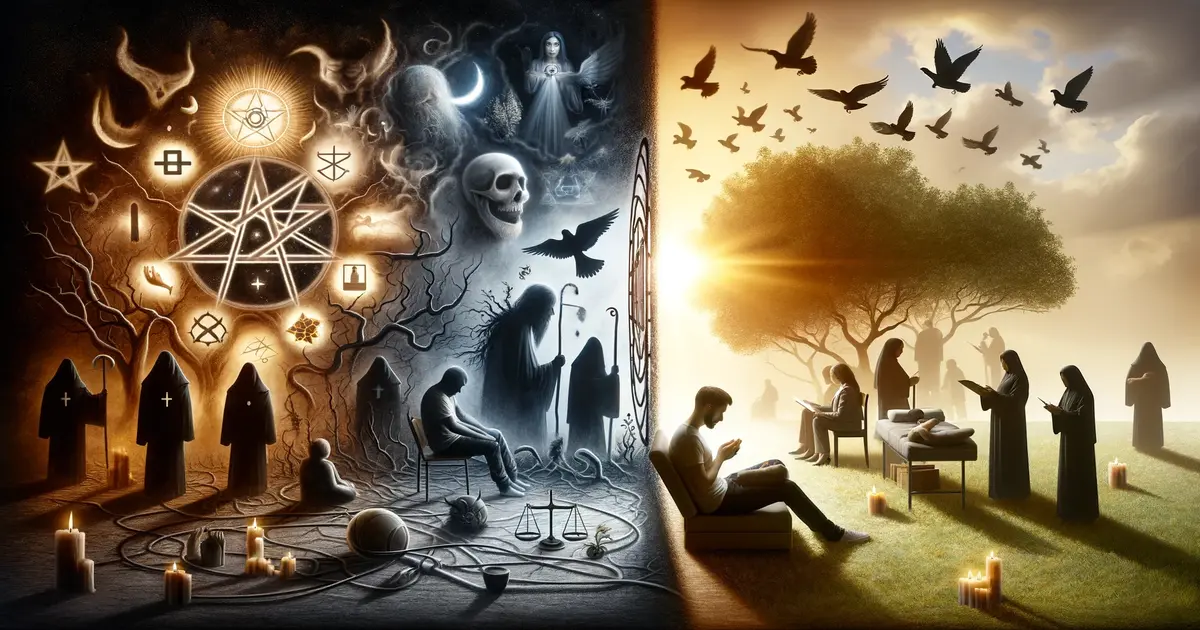The Truth About Spiritual Trauma And How To Address It!

In seeking spiritual fulfillment and understanding, we often turn to faith-based communities and religious leaders for guidance and support. However, what happens when these very sources of solace lead to pain?
This is where the concept of spiritual trauma comes into play, a profound and often overlooked aspect of psychological distress. Spiritual trauma may manifest when individuals feel betrayed, judged, or harmed by the practices, teachings, or figures within their religious environment.
This type of trauma may not only shatter one’s spiritual beliefs but can also deeply affect emotional well-being and personal identity.
Whether it’s due to rigid dogma, exclusionary practices, or the misdeeds of a trusted religious leader, those who experience emotional trauma find themselves at a crossroads, searching for healing and understanding.
This article dives into the intricate nature of spiritual strain, exploring its causes, impacts, and pathways to recovery.
Subscribe to Create Higher Vibrations!
Get Inspiration and Practical advice straight to your inbox.
What is spiritual trauma?
Recognizing religious chaos within a religious community can be challenging. It often manifests in ways that deeply impact an individual’s sense of self and their relationship with the divine.
Causes of spiritual trauma can range from experiencing exclusion or judgment within a religious or spiritual setting to more direct trauma and spiritual abuse at the hands of leaders or community members.
This form of trauma undermines the very foundation of an individual’s belief system, leading to profound questions about faith, trust, and identity.
Experts in the field, such as Dr. Beth L. Muehlhausen, Ph.D., suggest that “spiritual trauma disrupts a person’s core values and may cause a crisis of faith that profoundly affects their psychological well-being” (Muehlhausen, 2021).
This trauma is not just about a loss of faith; it’s about losing a part of one’s identity and community. It challenges individuals to rethink their place within their religious or spiritual frameworks and, often, their understanding of the world.
Spiritual abuse, a core component of mental trauma, can take many forms, including manipulation, coercion, and shaming, often under the guise of religious authority. The distressing part is that it’s perpetrated in a space that is supposed to offer sanctuary and peace.
As stated by psychologist Dr. Darius Leo, “The betrayal by a trusted religious leader or community can have lasting effects, shaking the foundation of trust and safety that supports our spiritual lives” (Leo, 2019).
Understanding the varied appearances of spiritual damage requires a deep dive into its causes and effects. The impact is profound and multifaceted. It can stem from rigid, dogmatic practices that leave no room for personal interpretation. It can also come from the isolation felt when spiritual questions lead to ostracization from the community.
As we explore “What Does Spiritual Trauma Look Like?”, it’s crucial to remember that recovery and healing are possible. The journey toward healing begins with recognizing the signs of trauma, understanding its origins, and taking steps to rebuild one’s spiritual and emotional health.

Spiritual trauma definition
Spiritual trauma occurs when an individual’s religious or spiritual beliefs and experiences cause emotional or psychological harm.
This type of trauma can result from exposure to strict doctrines, manipulative leaders, or abusive practices within a faith community. It disrupts a person’s sense of self, security, and connection to their spirituality, often leading to deep emotional scars and a crisis of faith.
Causes and Symptoms
The roots of spiritual trauma can vary widely, but common causes include:
How Is Spiritual Abuse Different From Religious Trauma?
Navigating the complex terrain between religious trauma and spiritual harm, it’s crucial to distinguish these experiences while acknowledging their profound impacts.
Spiritual trauma often stems from broader experiences within a faith community or doctrine, where systemic beliefs or practices might contradict or harm an individual’s values or sense of self.
On the other hand, spiritual harm frequently zeroes in on the interactions with a spiritual leader or specific religious experiences that leave deep emotional scars.
Imagine walking a path guided by faith, only to find that path crumbling beneath your feet due to the actions or teachings of those you trusted.
This is the heartache many endure when faced with religious trauma and spiritual harm. It’s not merely about questioning beliefs; it’s a profound disruption of one’s spiritual foundation, a betrayal that can shake the very core of one’s identity.
Consider, for a moment, the impact of a spiritual leader whose actions contradict the compassionate teachings they espouse.
Such contradictions can lead to a dissonance that reverberates through an individual’s entire religious experience, highlighting the distinct pain that spiritual abuse inflicts compared to the broader context of religious trauma.
While these experiences can deeply wound, they also offer a unique lens through which to examine faith, resilience, and the journey toward healing. By dissecting how spiritual abuse differs from religious trauma, we go into not just the definitions, but the lived realities behind these terms.
It’s about more than semantics; it’s about understanding the nuances of our spiritual journeys and the resilience of the human spirit in the face of betrayal and hurt.
As we unpack “How Is Spiritual Abuse Different From Religious Trauma?”, let’s keep the conversation open and inclusive.
Remember, it’s through sharing and understanding these distinctions that we can offer support and find pathways to healing for those navigating their way out of the shadows of spiritual harm and religious trauma.
Spiritual Abuse Can Block Spirituality
For many, spirituality is a journey toward finding meaning and purpose in life. Yet, for those who may have experienced spiritual distress and trauma, this path can feel blocked, as if an invisible barrier stands between them and their spiritual goals.
Spiritual abuse, often inflicted by those in positions of religious authority or within spiritual communities, can deeply scar one’s ability to connect with their spirituality, causing a profound sense of betrayal and loss.
This trauma can manifest as a questioning of one’s beliefs, a feeling of isolation from one’s spiritual community, or a pervasive sense of spiritual emptiness.
The impact of such experiences can be profound, leading to a state where the quest for meaning and purpose becomes overshadowed by pain and confusion.
It’s a stark reminder that spiritual distress and trauma do more than harm the individual; they can sever the connection to the very essence of what makes life feel meaningful.
8 signs of spiritual trauma
When trauma occurs, its impact can deeply affect our spiritual well-being. Spiritual trauma and moral injury often intertwine, leading to a profound questioning of one’s values and beliefs.
Yet, amidst this turmoil, there’s potential for spiritual trauma and post-traumatic growth. Recognizing the signs of divine damage is crucial for healing and transformation.
Let’s explore 8 signs that may indicate the presence of this profound challenge, opening the door to understanding and growth.
1. Lack of boundaries
A strong set of beliefs typically offers a framework for understanding the world, but when these boundaries are blurred or violated, the consequences can be devastating.
For individuals who’ve endured spiritual torture, such experiences may erode the very foundations of their personal and spiritual boundaries. This erosion can lead to confusion, loss of identity, and the painful struggle to redefine personal limits and safe spaces within and outside their spiritual lives.
2. Difficulty with making decisions
For those who have experienced trauma, especially in a spiritual context, decision-making can become a minefield of doubt and fear-based hesitation.
Traumatized individuals often find themselves paralyzed by the fear of making the wrong choice, reflecting the deep impact of past hurts that have undermined their confidence and trust in their judgment. This difficulty is a stark reminder of the long-lasting effects trauma can have on one’s ability to navigate life’s choices.
3. Hypervigilance
Hypervigilance is one of the key effects of religious trauma, where individuals become excessively alert to potential threats or triggers in their environment.
This constant state of alertness is not just a psychological response but a survival mechanism that can be exhausting and isolating. It’s a vivid illustration of how deeply trauma can embed itself into the psyche, affecting one’s ability to feel safe in both familiar and new contexts.
4. Self-hatred
Individuals who may experience abuse and trauma within a spiritual context often struggle with self-hatred, a corrosive effect that undermines their spiritual well-being.
This intense self-loathing can stem from internalizing negative messages received in abusive environments, leading to a harsh inner critic that persistently questions one’s worth and validity.
It’s a painful reminder of how deeply spiritual abuse can scar the soul, eroding the foundation of love and acceptance that underpins a healthy sense of self.
5. Perfectionism
Perfectionism can often be a trauma-informed response, especially as a result of religious teachings that emphasize flawlessness. This relentless pursuit of perfection is not about self-improvement but a deep-seated fear of criticism or punishment.
For many, it’s a coping strategy to avoid further pain, reflecting the profound impact that religious trauma can have on an individual’s psyche and behaviors. It’s a cycle that traps the person in an endless loop of striving and self-criticism, far removed from the compassionate core of spiritual teachings.
6. Shame
Psychological trauma and moral injury are fertile grounds for the growth of shame—a powerful and destructive emotion that can become a central coping mechanism for those affected.
This deep sense of shame not only impacts one’s self-esteem but also influences a wide range of coping mechanisms, from withdrawal and secrecy to overcompensation in other areas of life.
It’s a testament to the profound impact of spiritual abuse, highlighting the need for compassionate, trauma-informed approaches to healing and recovery.
7. Mental health disorders
Navigating through the aftermath of religious trauma and spiritual abuse can lead to a spectrum of mental health disorders. This journey is often marked by emotional trauma, an exhaustive battle with one’s inner self, and a devastating impact on self-esteem.
The road to recovery requires acknowledging these deep-seated issues, as they underscore the profound effects of spiritual abuse. By understanding the link between these experiences and mental health, individuals can begin to heal and reclaim a sense of self-worth.
8. Loss of community
The feeling of losing a spiritual or religious community can be overwhelmingly disorienting. If you’re feeling isolated, confused, or angry, know that these are natural responses to being uprooted from a place you once called home.
These emotions are often intertwined with painful memories, making the sense of loss even more acute. Finding a path through this maze of feelings is about creating new connections and rediscovering a sense of belonging that respects and nurtures your true self.
The Negative Impact of Spiritual Bypassing
When we experience spiritual trauma it can sometimes lead us down a path where we might skip over the real struggles we face, a concept known as spiritual bypassing.
This isn’t about ignoring what’s wrong or right, but it can unintentionally brush aside the deep wounds of spiritual harm or overlook the pain rooted in experiences like domestic abuse or emotional trauma.
It’s like putting a band-aid on a wound that needs more care. By acknowledging the full spectrum of our experiences, including the painful parts, we can embrace a more authentic and healing spiritual journey.
Spiritual bypassing, a term first coined by psychologist John Welwood in the 1980s, refers to the use of spiritual practices and beliefs to avoid dealing with our painful feelings, unresolved wounds, and developmental needs. Here are some ways people might be unknowingly committing spiritual bypassing:
Understanding and recognizing these patterns can be the first step toward more authentic spiritual and emotional growth, where spiritual practices enrich rather than evade the human experience.
How do you Heal spiritual trauma?
Recovering from spiritual agony is a deeply personal journey that involves confronting the complex interplay between good and evil within one’s spiritual experiences.
To heal from a spiritual wound, it’s crucial to embark on a path of self-discovery and healing, where one can explore the depths of their spiritual wounds and seek ways to mend them. Talking to someone who understands and can offer guidance is often a vital step in this process.
Whether it’s a therapist, a trusted spiritual advisor, or a support group, finding a safe space to express and work through your feelings is essential.
Ways to Overcome Spiritual Trauma
Harmful religious trauma, a form of complex trauma, can result from religious abuse, spiritual exploitation, or the loss of a spiritual community. To overcome a soul wound, consider the following steps:
These steps can help you process the trauma, reclaim your spirituality, and create a new sense of identity and connection to self. Remember that healing from a belief system trauma is a journey, and it may take time to process the feelings of loss and grief.
Final Thoughts
Understanding the relationship between religion, spirituality, and trauma can be challenging. This article explores the significant impact spiritual trauma can have on individuals and the various ways to heal and find understanding.
Healing from spiritual trauma is a personal journey. Whether you seek help from a mental health professional or spiritual coach, engage in personal reflection, or connect with supportive communities, there are many paths to recovery. This journey highlights the resilience of the human spirit in overcoming adversity.
If you are looking for a safe place, to discuss the trauma endured at the hands of religious leaders, please reach out to Vishnu Ra!




